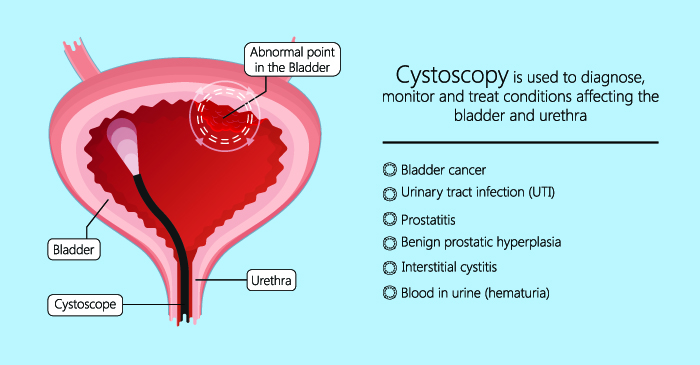Cystoscopy Surgery in Alwarpet, Chennai
The branch of medical science that deals with the ailments and disorders of the urinary tract are known as Urology. Interventional (invasive) medical procedures like surgeries make up a significant portion of urology.
Urological surgeries are required for the pelvis, colon, urogenital and gynecological ailments for treating obstructions, dysfunction, malignancies, and inflammatory diseases. Diagnosing these disorders is essential for maintaining the health of your urinary tract. Cystoscopy is an important medical procedure that assists urologists in diagnosing a patient’s urological issues. If you have symptoms that might need Cystoscopic treatment, find some of the best Cystoscopy specialists in Alwarpet, Chennai.

Cystoscopy Treatment
A cystoscope is an optical device that has a lens attached to a tube for inserting into the urethra and moving towards the bladder. This allows the doctor to closely examine the inner lining of the bladder, observe it on a screen, and look for any abnormalities. A cystoscopy enables the urologist to diagnose the patient’s urinary tract for obstruction, bladder cancer, retention, bladder control issues, urinary tract infections, or enlarged prostates.
As a device made of an illuminated camera attached to a small-sized tubule, a cystoscope is particularly useful as a medical imaging device. The feed from the camera is displayed on the screen with magnification, which helps the urologist to determine the right treatment for the patient’s urological disorders. The examination is a minimally invasive procedure, as the patient experiences negligible pain compared to other techniques.
Who qualifies for a cystoscopy?
Your urologist may recommend you to undergo a cystoscopy examination if you experience:
- Urinary tract infections (often recurring)
- Bladder cancer
- Bladder stones
- Dysuria (pain while urinating)
- Hematuria (blood passed through urine)
- Urinary retention
- Enlarged prostate
- Other bladder control issues
- Pelvic pain
- Overactive bladder
- Bladder tumors
- Non-cancerous growth like cysts
- Inflammation along the ureter (urinary tract)
- Cystitis or interstitial cystitis
- Ureteropelvic junction obstruction
Why is the cystoscopy conducted?
The procedure allows your urologist to closely examine your urinary tract, to make sure that the organs are fully functional and healthy. A magnified feed from the cystoscope displayed on the screen provides real-time visuals for the doctor. Through a cystoscopy, the doctor can also check for any symptoms of an infection, disorder, or disease, in its early stages.
Thus, a cystoscopy treatment ensures an effective diagnostic medium and helps to locate the early signs of a urinary disorder. This often entails speedy detection and assists in diagnosing and preventing the issue from exacerbating. It also plays an important role in planning and executing a urological surgery. This makes cystoscopy treatment a valuable detection technique for urologists and urological surgeons.
What are the benefits of a cystoscopy treatment?
The primary benefit of a cystoscopy treatment is the exact diagnosis of the medical issues of the urinary tract, bladder, and urethra. A doctor can examine abnormalities, and look for signs of urological issues, disorders, or diseases. A cystoscopy can also enable a biopsy, wherein the urologist can obtain small tissue samples through the tubule, to determine its malignancy.
If you believe that you are experiencing the symptoms of a urinary disorder, you should consult with a cystoscopy specialist in Mumbai.
Request an appointment at Apollo Spectra Hospitals, Alwarpet, Chennai.
Call 1860 500 2244 to book an appointment.
What are the Risks or Complications of a cystoscopy?
Some of the minor complications of a cystoscopic examination are:
- Burning sensation and irritation while urinating
- Bleeding through urine
- Frequent urge to urinate
- Inflammation, swelling, or redness
Some of the serious complications of a cystoscopic examination are:
- Infection
- Bleeding due to the biopsy
- Hyponatremia
- Ruptured bladder wall
Since saline water is inserted into the bladder following the surgery, it reduces the risk of contracting an infection. Nevertheless, if you experience pain, fever, chills, or any other issue after surgery, consult with your urologist.
Conclusion
Thus, a cystoscopy offers a minimally invasive, and least painful method of examining your urinary tract. Through cystoscopy treatment, your urologist can diagnose and recommend the appropriate treatment for your urinary disorders. Negligence in treating these disorders can harm the patient’s urinary tract, and inflict damage to their overall health.
If you experience any discomfort or any symptoms of a urinary disorder, you must consult with a cystoscopy doctor near you.
Request an appointment at Apollo Spectra Hospitals, Chennai, Mumbai.
Call 1860 500 2244 to book an appointment.
Yes, a cystoscopy treatment is a safe and secure diagnostic technique for detecting urinary disorders.
The cystoscope could be rigid (for performing biopsy) or flexible (to travel further up into the ureter/bladder), depending on the urological requirements.
Patients should avoid heavy lifting, alcohol, or operating complex machinery. A damp cloth should be used to reduce the pain. The patient must consume fluids in an adequate amount, and report to the urologist in case the pain does not go away within two weeks.
Symptoms
Our Top Specialities
NOTICE BOARD
CONTACT US
CONTACT US
 Book Appointment
Book Appointment


.svg)
.svg)
.svg)
.svg)








